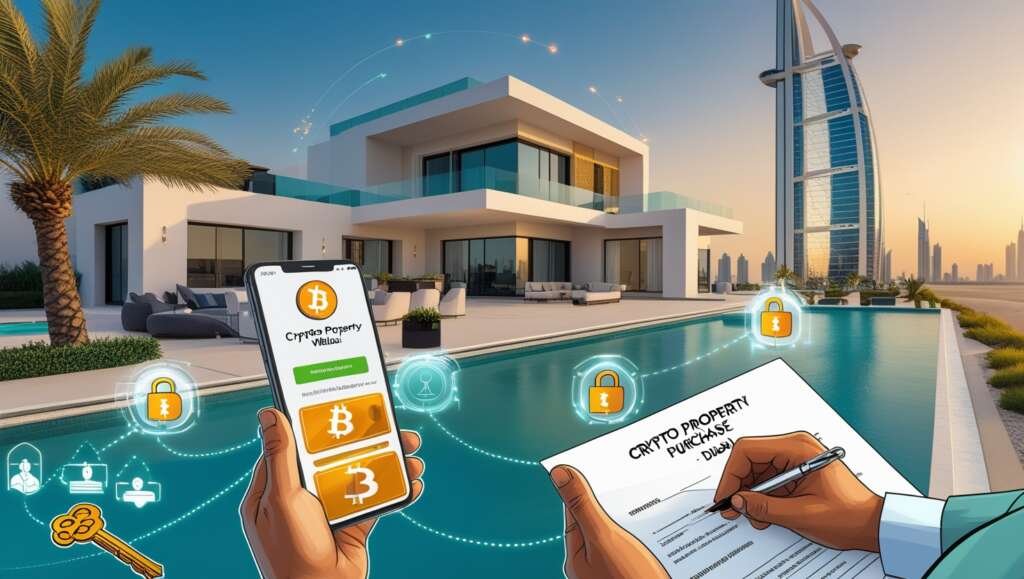Dubai is quickly becoming a global destination for innovation in blockchain and cryptocurrency. The real estate sector has also adapted to these changes, allowing for authentic and regulated purchases of homes and luxury properties with cryptocurrencies such as Bitcoin, Ethereum, and stablecoins. This detailed guide provides relevant information about the legal and regulatory frameworks, secure method of payment, risks and rewards of purchasing real estate using cryptocurrencies in Dubai.
Dubai’s Regulation: A Guide to Seamless Crypto Property Transactions
The Virtual Assets Regulatory Authority (VARA) has been the most comprehensive and responsible regulator for digital asset services in the MENA region since being appointed in 2022. Under VARA, licensed platforms such as Binance UAE, and Nomura’s Laser Digital, can provide safe and secure knowledge of crypto-to-fiat conversion to acquire property. The Central Bank of the UAE (CBUAE) has mandated strict regulations with the Payment Token Services Regulation which includes full KYC (Know Your Customer) and AML (Anti-Money Laundering) standards for all stablecoin-to-AED conversions after August 2025. Property can only be registered with Dubai Land Department (DLD) in the UAE Dirham, meaning that every crypto purchase will need to be converted to AED via approved channels prior to completing registration.
Leading Developers Are Now Accepting Crypto Payments
DAMAC Properties, the largest developer in the United Arab Emirates, now accepts cryptocurrency payments for luxury developments and off-plan properties. Other major players in Dubai’s real estate market—such as Emaar Properties, Nakheel, and several others—also accept Bitcoin, Ethereum, and stablecoins like USDT and USDC as valid forms of payment.Brokerage sites like Hayvn, Crypto.com, and Prypco are helping facilitate the underlying crypto to AED (United Arab Emirates Dirham) conversion. By early 2025, international buyers drove a rise in crypto adoption, completing around 3% of off-plan property purchases in Dubai using cryptocurrency. They were attracted by the speed, transparency, and lower transaction costs.
How Does Crypto-to-AED Property Transaction Works
When purchasing property in Dubai using cryptocurrency, developers and buyers follow a set of prearranged steps. These steps actively ensure compliance with regulations while embracing technological innovation.
1. Select a crypto-friendly agent or developer that structure contracts to legally accept cryptocurrency payments.
2. Negotiate a contract that permits payment in BTC, ETH, or stablecoins. Ensure the cryptocurrency is converted to AED before the property registration.
3. Exchange crypto for AED at licensed providers such as Rain or Binance UAE. Some providers have instant exchange rates and offer embedded compliance tools.
4. Perform KYC and AML validation, documenting the source-of-funds and wallet histories, because this is expected under law in the UAE.
5. Register the property with DLD. This finalizes the sale in AED; blockchain supported smart contracts are an additional feature, but do not replace registering with DLD.
6. Complete the legal paperwork to transfer ownership, verifying, along the way, that every step conforms to law and regulation in the UAE.
This process relies on the rigours of law for crypto-based property purchases as applies to all property purchases but with the simplicity of digital assets.
Advantages of Using Crypto for Buying Property in Dubai
Speed: crypto payments take minutes or hours to settle, not days like regular wire transfers.
Lower Costs: crypto transaction costs typically range under 1%, while traditional overseas wires are typically 2-5%.
Universal Access: crypto uses cryptocurrency which allows foreign transactions to be made without having to go through a currency exchange process.
Full records: Blockchain has a built-in audit trail which means there is a permanent record of transactions. These records may be highly advantageous for buyers and regulators.
Risks and Mitigation Strategies
1. Price Volatility: You need to be aware that as a buyer, cryptocurrencies are very volatile. A price movement of just a few percent in Bitcoin or Ethereum can translate into tens of thousands of dirhams in a property transaction. If you’re paying with a volatile coin, its value could drop significantly between signing the agreement and final settlement. To manage this risk, most experienced buyers choose to use stablecoins such as USDT or USDC. Others mitigate volatility by locking in the exchange rate at the time the sales contract is signed.
2. Inconsistent Regulations: Dubai has made significant progress in establishing a regulatory framework for digital assets. However, the landscape is still evolving. Government bodies like the Virtual Assets Regulatory Authority (VARA) and the Central Bank of the UAE (CBUAE) continue to update their compliance rules. These updates focus on areas such as KYC, AML, and crypto-to-fiat conversion protocols to stay aligned with regulatory priorities.
3. Improper (Unregulated) Platforms: As demand for crypto-based real estate grows, many unlicensed service providers have entered the market. These platforms often attract buyers with low fees or fast processing but operate without proper regulatory oversight. While these “features” have some bi-product of merit, they raise significant legal and financial risks. Using a platform that isn’t licensed under VARA or lacks proper AML controls increases the buyer’s risk. The Dubai Land Department (DLD) may reject the transaction or flag it as suspicious.
4. Transparency and Compliance: The UAE has a very transparent system of laws and regulations governing the property market. Any buyer, no matter where they are from, needs to provide a clear audit trail, including KYC requirements and source-of-funds verification, and in some instances, proof of wallet history. If they don’t provide sufficient documentation, they may face transaction declines, delayed registrations, or worse, charges for violating AML laws.
Innovation on the Horizon: Tokenization and Fractional Ownership
Dubai is not only enabling crypto payments but is pioneering property ownership models powered by blockchain:
-
Tokenization Projects: In early 2025, DAMAC Group partnered with MANTRA to tokenize over $1 billion worth of real-world assets. The initiative aims to offer fractional digital ownership across luxury real estate and data centers.
-
Fractional Ownership Platforms: VARA‑licensed projects like Prypco Mint allow investors to buy fractional property shares, starting from AED 2,000. A tokenized villa in Dubailand sold out in just minutes, demonstrating high demand among both domestic and international investors.




